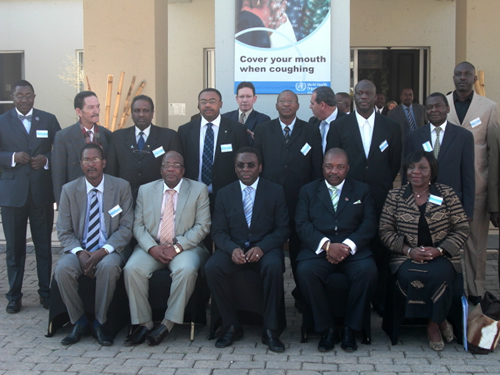Pandemic Influenza puts additional pressure on sub Saharan Africa’s health systems

Johannesburg, 11 August 2009 -- The emergence of the Influenza A (H1N1) 2009 Pandemic puts an additional pressure on health systems of African countries already stretched with other competing public health priorities, said Dr Luis Gomes Sambo, the World Health Organization's (WHO) Regional Director for Africa.
He was addressing delegates at the Regional Conference on Pandemic Influenza, which commenced today (11 August) in Johannesburg, South Africa, organized by the World Health Organization.
More than 230 delegates including Public health experts, Physicians, Pharmacists, Laboratory specialists, Health promotion officers and partners from within and outside the WHO African region are attending the conference.
The three-day event will update delegates on the epidemiology of the current pandemic, the processes of national preparedness and response to A (H1N1), develop regional strategies for resource mobilization as well as share experiences among countries.
The Regional Director pointed out that, the African region, the last to be affected amongst the 6 WHO regions, has as of today 1464 confirmed cases and 2 confirmed deaths reported by 16 countries out of 46. The current public health context in the African region is still dominated by the very high burden of diseases, very high maternal mortality rates and high infant mortality.
"Sub-Saharan Africa is hosting 66% of the total burden of HIV/AIDS pandemic, 31% of Tuberculosis burden and 86% of the total burden of Malaria. This region is prone to recurrent epidemics such as hemorrhagic fevers, meningitis and water-borne diseases for example cholera" he said.
He urged delegates not to distort the public health focus in the African region but rather accommodate the response to this emerging threat in health sector reforms and the strengthening of health systems.
Dr Sambo referred to the funding gap of nearly US$ 31 million required for the implementation of the African regional preparedness and response plan and called on African governments to accelerate their efforts in mobilizing national and external resources to meet their needs.
He went on to say that the pandemic influenza A (H1N1) 2009 is a matter of global concern and no country can do it all on its own. Therefore, partnerships and international solidarity are essential components of the global, regional and country strategies to defeat this pandemic.
"In our view these principles should materialize in concrete actions such as sharing of influenza viruses, access to new technologies including vaccines and other related benefits. Solidarity should also be extended to bridge the financial gaps of the national and international health development agenda", he said.
The Regional Director laid emphasis on the importance of social mobilization and regular communication of updated information to the public, health workers and other national stakeholders. He said this should include what is known and not known about the pandemic, when and how to seek health care and measures people can take to reduce their risk of infection.
"Doing so will give the opportunity to people to realize the important role they can play to control and even stop the spread of the Pandemic virus at community level', he added.
In his opening remarks, Dr Aaron Motsoaledi, Minister of Health of South Africa commended the World Health Organization for organizing the conference and said that the African continent has always been worst affected by any outbreak of a communicable disease. History has taught us that epidemics and pandemics can have enormous social and economic consequences in a closely interconnected and interdependent world.
"It is therefore essential for all countries within the continent to ensure that they are adequately prepared to deal with the Influenza pandemic. What is of particular concern to us as Africans is that although the pandemic has spread to our continent last, we may be more severely affected by it", he added
The conference will deliberate on technical issues such as:
- Pandemic influenza epidemiology
- Potential impact of an influenza pandemic in Africa
- Surveillance for initial cases/clusters and monitoring the spread
- Laboratory confirmation before and during the pandemic
- Prevention and controlling infection : public health measures
- Patient management and infection control
- Communications
- Maintaining routine healthcare services during a pandemic
- Resource mobilization and funding gaps
In April 2009, the first case of Influenza A H1N1 was reported in Mexico. Since then the virus has spread to other parts of the world affecting over 166 countries with confirmed cases in excess of 174913 and 1411 deaths.
For more information, please contact:
Technical queries - Dr J.B Roungou Roungouj [at] afro.who.int (Roungouj[at]afro[dot]who[dot]int) 00 472 413 9154
Media queries - C. Boakye-Agyemang Boakyec [at] afro.who.int (Boakyec[at]afro[dot]who[dot]int) 00 472 413 9420


